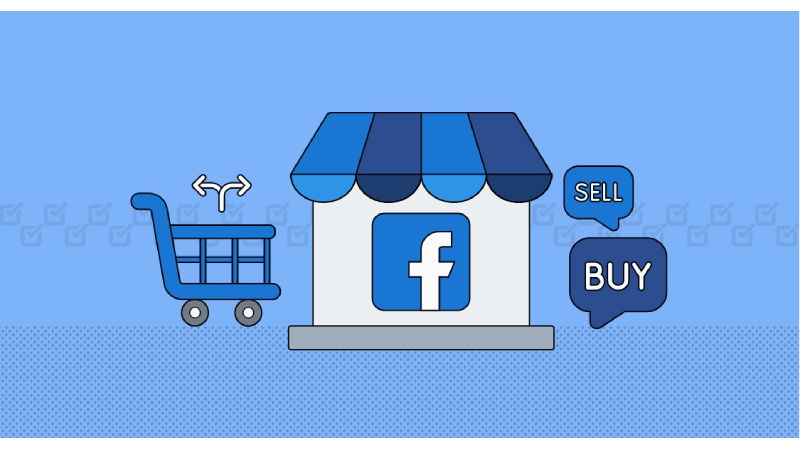Tech
Best Tips to Profit from Facebook Marketplace

Find out how to make extra money by learning how to sell goods on Facebook Marketplace! Decluttering is simple, and it can earn you some quick cash.
These are quick, easy, and straightforward tips for selling products online. To make quick money and keep yourself safe, make sure you read through our selling advice.
When is the ideal time to post goods for sale on the internet?
The first few months of the year are ideal for organizing and decluttering your home.
You’re stuck inside because it’s usually cold or dark outside; you need to put away Christmas gifts; you’re eager to start working on your New Year’s resolution to organize yourself better; and spring cleaning is almost here.
Making decisions about what to do with items that you don’t need but that still have value can be challenging when decluttering.
You can hold onto items until you have time to hold a garage sale, but when will that be—and will you really hold one—in the coming months? Craigslist allows for sales, but dealing with strangers can be difficult.
Should I donate instead?
Donating the items to a nonprofit allows you to deduct the cost from your taxes; however, if you opt for the standard deduction, the donation cannot be deducted.
Even though the donation value guide may not allow for higher-value items, you still need to make arrangements to drop them off and receive a receipt.
Alternatively, you can use a Facebook buy/sell group to sell your belongings.
How to find Facebook buy/sell groups
On Facebook, local buy/sell groups have grown incredibly popular. Typically, the groups are delineated by a specific geographic region, ranging from modest suburbs to major cities or entire counties. Since any individual can start a group and run it, each one has its own set of rules and regulations.
Administrators may set their own membership requirements, and only members may view these groups. Certain groups require documentation (through your Facebook profile) proving you are a resident, employee, or connected to the area, or that you are friends on Facebook with other group members.
Other groups are just Craigslist on a smaller scale. Enter a few keywords, such as “buy and sell” plus the name of your location, into the Facebook search bar at the top to locate local buy/sell groups in your area.
You can also just type in the name of your local area and scroll through the list to find any resale pages, or you can search “resale” or “local to” plus your location.
The nearest suburbs to the neighborhood likely have about twenty resale groups.
Benefits of buy/sell groups
- Because every user is associated with a profile, they are not entirely anonymous. It won’t take long for someone in the group to report any wrongdoings, even though anyone can make a fake profile (see the following safety measures). Even if a person’s profile is set to private, you can still view some of its contents, such as whether you have any mutual friends. It feels more genuine to know that a buyer or seller is a friend of your friend.
- If you have a problem, the group administrator should assist you in fixing it. If the problem is serious or persistent, they may also choose to ban someone from the group.
- When selling new or nearly new items, you can get a higher price than you would from a consignment or resale store, where a portion of the sale goes toward covering overhead.
- They have a more communal vibe; you might become acquainted with regular buyers or sellers and even form friendships.
- You don’t have to sift through thousands of listings that you aren’t interested in because some groups are tailored to your specific needs, such as kids’ clothes, maternity and/or baby items, kids’ clothing, clothing only, and no clothing allowed.
- It will save you from having to travel across the city to meet the buyer or seller because pickups are typically restricted to the locally defined area.
Here are some buying and selling tips for Facebook
- Be familiar with the guidelines
Take note of each group’s rules and lingo and abide by them. When you violate the rules, you run the risk of being expelled from the group or publicly humiliated by other forum users, which infuriates people. Rules vary from group to group, but they should all be adhered to.
Post an ISO (in search of) message if you’re looking for something specific. You’ll probably find what you’re looking for and it will save you time searching.
- Equitable pricing and listing of goods
Set a reasonable price for your products. Too-expensive items will be scrolled past by users. Don’t be greedy—any dollar you make is more than you would have if you threw the item away or donated it. Your chances of selling your goods will increase if you set a low price, and anything is better than nothing. Anything that is stuffed in a box or hanging in your closet isn’t worth a few bucks.
It needs to be priced as used unless it is brand-new with tags. It’s still used, even if it’s only been worn once or twice (if you’re being honest, it was probably worn five or six times). “Worn once or twice” is the standard description, and it’s usually obvious that this is untrue.
Provide information on sizes, dimensions, conditions, and any other questions you think people might have. Compared to back and forth in comments or messages, it will save a ton of time.
Be prepared to bargain a bit. Even with a fair price, you should still anticipate a lower offer. If there are no other buyers, take into account the reduced price.
- Be honest
Be absolutely truthful when listing items. If there are any defects, please mention them and attach a photo. Give honest information regarding fading, spots, and condition since a buyer won’t buy anything until they inspect it. If you don’t, you’ll waste everyone’s time and they won’t buy from you again.
Keep in mind that you are selling items that you do not want. If no one is buying, it’s either too expensive or unappealing junk. Reduce the cost, give it away, or discard it.
- Make smart buyer
Be a wise consumer. When making a purchase, arrive on time, have exact change, or overpay, and don’t expect the seller to make up the difference.
Items that you aren’t entirely sure you want to buy should not be claimed. To “hold their spot” while they consider an item, people will reply that they are interested in it. This allows them to delay responding to the seller while other potential buyers wait in line. It’s unfair to all of them.
Before exchanging money, carefully inspect the item; if it’s not what you expected, especially if the buyer misrepresented it, don’t be afraid to change your mind. It should be enough to say, “No thanks, it’s not what I expected.”
- Watch your reputation
Act with integrity and kindness. You’ll get a bad reputation if you are unkind, lie about the state of the items, haggle over prices all the time, fail to show up for pick-ups, or leave less money than expected.
People will complain about you, request that you be removed from the group, or block you from viewing their posts.
Furthermore, keep in mind that these are members of your community; you might need to see them frequently or they might turn out to be the parent of your child’s friend.
- Be safe
- Meet in a public setting unless you are acquainted. Instead of attempting to set up a public meeting, many people will ask that you pick up purchases at their house or offer porch pick-up if they won’t be home and designate somewhere for you to leave the money. This might not be safe. The dangers can include being put in danger, having someone steal your item and run off with the money left by another customer, or both.
- If you are setting up a porch pick-up or meeting at a home, especially, do not post your address, phone number, schedule, or details of your availability in the post or comments. Instead, share all of these private details with the buyer or seller only via private message.
- Inform someone of the location and time of your buyer meeting.
- In case there is a problem, hold onto your emails and messages until the transaction is finished.
- Accept and pay only in cash (and be aware of the signs of fake money). PayPal is a secure substitute if you know the individual.
-

 Festivals & Events4 weeks ago
Festivals & Events4 weeks agoList of March National Days for Small Business Marketing to Boost Your Brand
-

 Business2 weeks ago
Business2 weeks agoNayef Doleh Examines International Humanitarian Fundraising Strategies
-

 Business3 weeks ago
Business3 weeks agoHow Black Banx is Redefining Global Banking Strategies in 2025
-

 Tech3 weeks ago
Tech3 weeks agoMicrosoft Teams to End SMS Messaging Feature Support for Android Phones and Switch to Phone Link App as Alternative
-

 Tech4 weeks ago
Tech4 weeks agoHow to Switch Between Microsoft Teams and Skype, How To Export Messages, Files, and Contacts from Skype Before It Shutting Down
-

 Business4 weeks ago
Business4 weeks agoPurpose of the AIRdiamond Project
-

 Startup3 weeks ago
Startup3 weeks agoFrom Trends to Sales: How Small Businesses Can Capitalize and Maximum Reach on Social Media
-

 Business1 week ago
Business1 week agoHow to fill MSME Form 1? Step-by-Step Guide





















